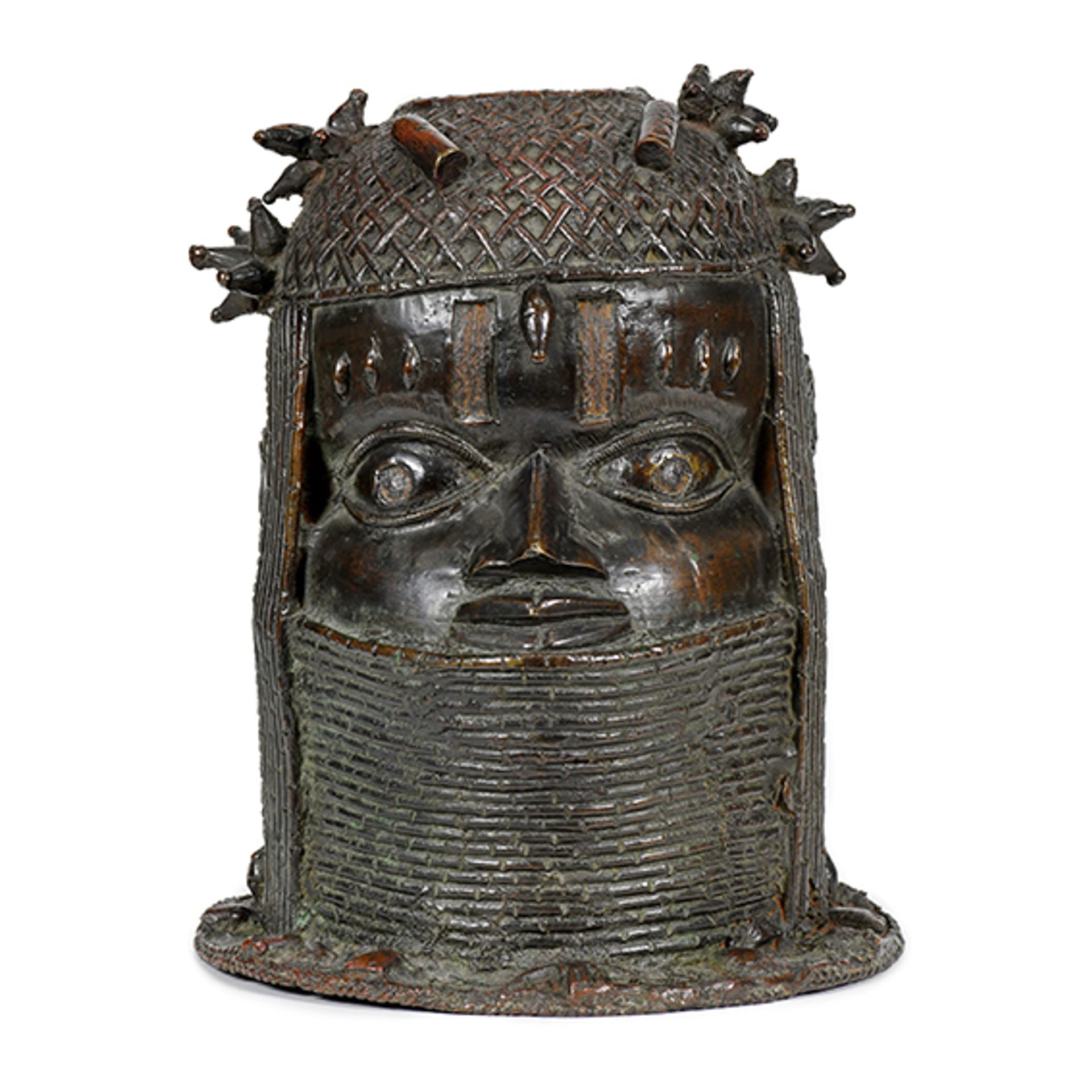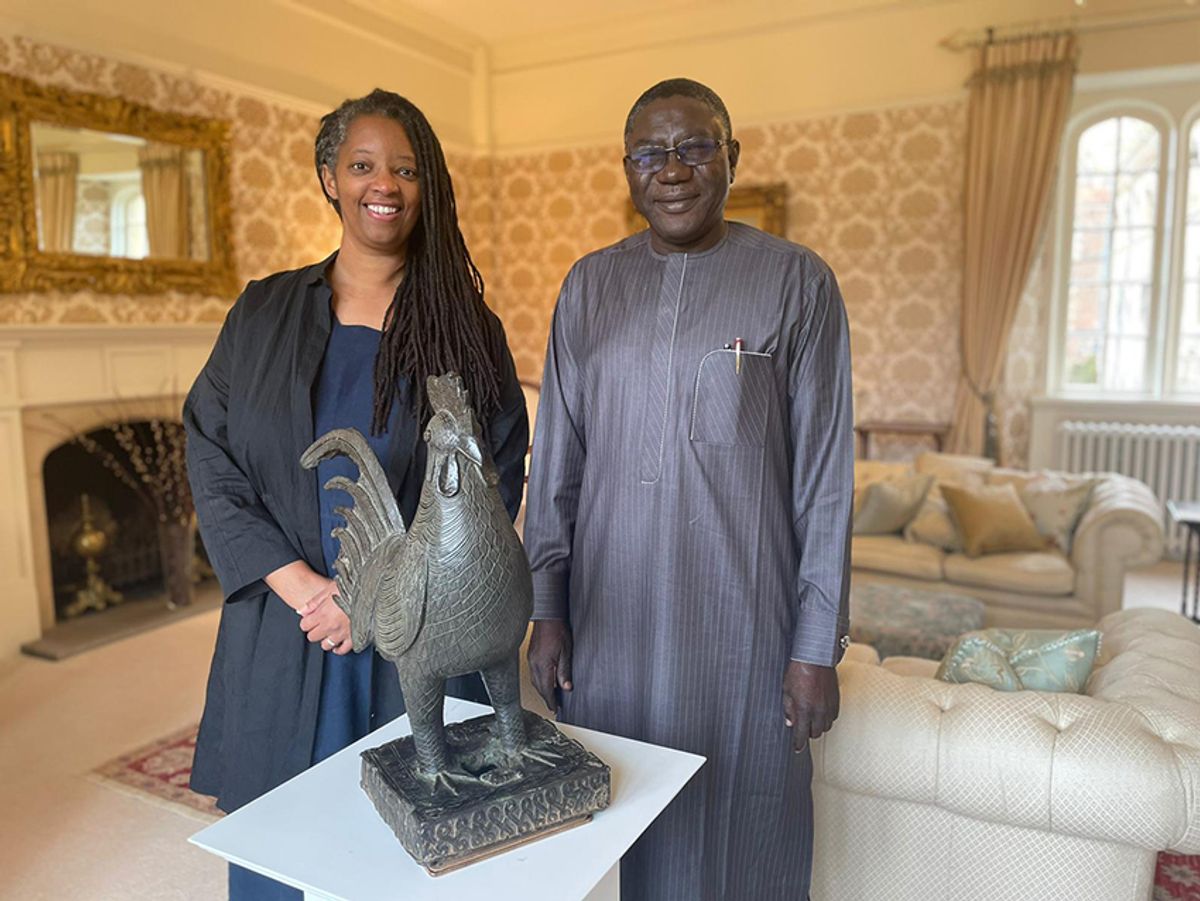Jesus College at the University of Cambridge has become the first UK institution to restitute a Benin bronze to Nigeria, to be followed today by the University of Aberdeen—moves that Nigerian officials hope will prompt Western museums to return further looted artefacts.
A celebratory, music-filled handover ceremony at Jesus College yesterday, which was livestreamed online, culminated in the signing of legal documents completing the return of a bronze cockerel, known as Okukor, that had been donated to the college by the father of a student in 1905. The Nigerian signatories present included Professor Abba Isa Tijani, the director general of the National Commission for Museums and Monuments of Nigeria and Prince Aghatise Erediauwa, the brother of Ewuare II, the current Oba of Benin.
The college first announced its decision to restitute the cockerel to Nigeria in November 2019, following campaigning by students and the recommendations of a working group tasked with investigating the college’s historic ties to slavery and colonial violence. The group concluded that “there is no doubt” that the bronze was looted directly from the royal court of Benin—a kingdom later absorbed into Nigeria—during a punitive expedition by British colonial forces in 1897.
The master of Jesus College, Sonita Alleyne, hailed the handover yesterday as a “simple” decision to “right a wrong”. “We are the first institution to realise that the moral imperative is powerful enough to propel one through the host of reasons sometimes given as to why this is a difficult task,” she said. “We are proud to be the first institution to simply act, to just do it. This Benin bronze, this Okukor, does not belong to us.”
Professor Tijani commended the college as a “great example to other institutions and other countries” and expressed optimism that Nigeria’s National Commission of Museums and Monuments will return to Cambridge in future to receive further Benin bronzes from the university’s Museum of Archaeology and Anthropology.
He anticipated future co-operation with international institutions to show and research the returning Benin bronzes. “I believe we will partner with the international community, with museums all over the world, so we will be able to [share] collections for collaborations in exhibitions, in research. We look forward to that.”
Tijani also called on the British Museum, which holds around 900 pieces from the kingdom of Benin, the world’s largest single collection, to “take a cue from what Jesus College have done and what Aberdeen will do”. The Nigerian government this month submitted a formal letter to the British Museum requesting the repatriation of Nigerian antiquities in its collection.
The British Museum is prohibited from permanently removing items from its collection under a 1963 UK law. It is, however, in talks with the Nigerian authorities to lend Benin objects to the planned Edo Museum of West African Art in Benin City, as part of a wider coalition of European institutions known as the Benin Dialogue Group.

The sculpture depicting an Oba (king) of Benin will be returned to Nigeria in a ceremony this afternoon Image: courtesy of University of Aberdeen
The University of Aberdeen will hold its own ceremony this afternoon to legally transfer ownership of a Benin bronze depicting the head of an Oba, which was purchased at a Sotheby’s auction in 1957 and held in its museum collections. The university’s governing body approved the unconditional return of the artefact to Nigeria in March this year, citing the “immoral” circumstances of its acquisition. The university vice-chancellor, Professor George Boyne, says: “Over the last 40 years the Benin bronzes have become important symbols of injustice. It would not have been right to have retained an item of such great cultural significance that was acquired in such reprehensible circumstances.”
In a statement, the Oba of Benin, Ewuare II, expressed thanks to the University of Aberdeen for a “noble act” and hope that “other institutions worldwide will see the injustice when they insist on holding on to items which in fact should be a reminder to them of the great injustice that was inflicted on a people so far away and so long ago”.


